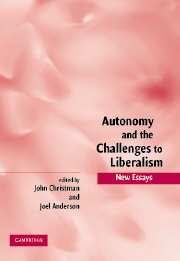Book contents
- Frontmatter
- Contents
- Contributors
- Preface
- Autonomy and the Challenges to Liberalism
- 1 Introduction
- PART I THE SELF: CONCEPTIONS OF THE AUTONOMOUS SELF
- PART II THE INTERPERSONAL: PERSONAL AUTHORITY AND INTERPERSONAL RECOGNITION
- 5 Taking Ownership: Authority and Voice in Autonomous Agency
- 6 Autonomy, Vulnerability, Recognition, and Justice
- 7 Autonomy and Male Dominance
- PART III THE SOCIAL: PUBLIC POLICY AND LIBERAL PRINCIPLES
- PART IV THE POLITICAL: LIBERALISM, LEGITIMACY, AND PUBLIC REASON
- Bibliography
- Index
6 - Autonomy, Vulnerability, Recognition, and Justice
Published online by Cambridge University Press: 02 December 2009
- Frontmatter
- Contents
- Contributors
- Preface
- Autonomy and the Challenges to Liberalism
- 1 Introduction
- PART I THE SELF: CONCEPTIONS OF THE AUTONOMOUS SELF
- PART II THE INTERPERSONAL: PERSONAL AUTHORITY AND INTERPERSONAL RECOGNITION
- 5 Taking Ownership: Authority and Voice in Autonomous Agency
- 6 Autonomy, Vulnerability, Recognition, and Justice
- 7 Autonomy and Male Dominance
- PART III THE SOCIAL: PUBLIC POLICY AND LIBERAL PRINCIPLES
- PART IV THE POLITICAL: LIBERALISM, LEGITIMACY, AND PUBLIC REASON
- Bibliography
- Index
Summary
One of liberalism's core commitments is to safeguarding individuals' autonomy. And a central aspect of liberal social justice is the commitment to protecting the vulnerable. Taken together, and combined with an understanding of autonomy as an acquired set of capacities to lead one's own life, these commitments suggest that liberal societies should be especially concerned to address vulnerabilities of individuals regarding the development and maintenance of their autonomy. In this chapter, we develop an account of what it would mean for a society to take seriously the obligation to reduce individuals' autonomy-related vulnerabilities to an acceptable minimum. In particular, we argue that standard liberal accounts underestimate the scope of this obligation because they fail to appreciate various threats to autonomy.
The reason these vulnerabilities have been underestimated, we believe, is because autonomy has generally been understood in an essentially individualistic fashion. The alternative account of autonomy we sketch here highlights the ways in which individuals' autonomy can be diminished or impaired through damage to the social relations that support autonomy. By articulating a conception of autonomy in terms of, more specifically, a theory of mutual recognition, we aim to pinpoint the individualistic bias in liberal accounts and the concomitant underestimation of our dependence on relationships of respect, care, and esteem. We conclude by anticipating some broader implications of this for how proceduralist accounts of social justice ought to be revised.
- Type
- Chapter
- Information
- Autonomy and the Challenges to LiberalismNew Essays, pp. 127 - 149Publisher: Cambridge University PressPrint publication year: 2005
- 169
- Cited by



